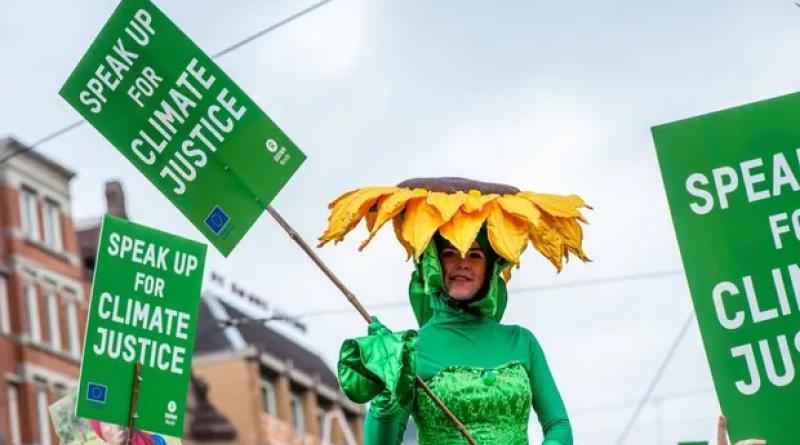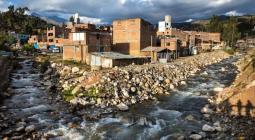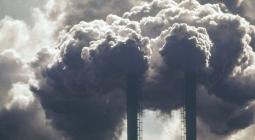Why environmental disaster victims are looking to European courts

Campaigners are finding courts increasingly open to considering cases – and finding in their favour
Between 2004 and 2007, the villages of Oruma, Goi and Ikot Ada Udo in Nigeria were polluted with oil from infrastructure built by Royal Dutch Shell. More than 15 years later, in late December, the company finally agreed to pay four farmers and their communities €15m in compensation and install a leak detection system after a court in the Netherlands ruled that Shell’s Nigerian subsidiary was liable and the parent company had a duty of care.
The legal battle has been so long that all the original claimants have died and Shell admits no liability under the settlement. But Milieudefensie, the Dutch arm of Friends of the Earth that fought the case, says it shows “large-scale polluters all over the world that they can no longer get away with destructive practices”.
Many big European companies operate abroad and until recently it was difficult to hold them to account for environmental damage they may have caused. But victims are finding European courts increasingly open to considering their cases – and finding in their favour.
In November, a Dutch court ruled that it had the authority to hear a claim for compensation brought against the Oslo-based aluminium producer Norsk Hydro and its subsidiaries over pollution in northern Brazil. It was a welcome decision for the thousands of Indigenous people and descendants of slaves who are suing the company for harming their local environment and public health, although Norsk Hydro “strongly denies” their allegations.
The Norsk Hydro decision was the third in a string of jurisdictional successes last year led by the law firm Pogust Goodhead. Communities lost to damage caused by salt mines in northern Brazil also secured the right to sue the petrochemical company Braskem in the Netherlands, while victims of the Mariana dam disaster began making their claim against mining giant BHP in December after the UK’s court of appeal gave them permission to pursue class action.
These followed landmark UK court rulings that Vedanta Resources could be sued for the activities of its subsidiary in Zambia and that Shell might owe a duty of care to Nigerian citizens for alleged environmental damage and human rights abuses by its Nigerian subsidiary.
Vedanta has since settled with the local community, but the other companies targeted in these lawsuits stress that the courts have not yet judged the cases on their merits.
Nonetheless, Tom Goodhead, the global managing partner of Pogust Goodhead, says European courts are increasingly becoming the gatekeepers of environmental damage caused by large corporations. “It’s one of the fastest developing areas of law. As well as the UK, there have been cases in the Netherlands, France, Germany and Sweden. There’s quite a considerable movement to try to hold companies accountable in the courts of their domicile.”
The most promising new piece of legislation to do this is the French duty of vigilance law, which requires all large businesses headquartered in France and international corporations with a large presence there to set out clear measures to prevent human rights violations and environmental damage.
The first case to test the law was filed against the French energy company TotalEnergies in 2019 over its huge oil project in Uganda and Tanzania. French and Ugandan NGOs claim the company’s environmental oversight plan for the controversial East Africa Crude Oil Pipeline did not comply with the law.
After a court hearing in December, they are now waiting for a ruling. TotalEnergies deems its vigilance plan to be “effectively in place” and says it has made sure its Ugandan affiliate has implemented the action plans necessary to respect the rights of local communities.
“The law on duty of vigilance is very clear that it covers violations or risk abroad, so there shouldn’t be a challenge about that,” says Juliette Renaud, a senior corporate accountability campaigner with Amis de la Terre, the French arm of Friends of the Earth and one of the NGOs involved. “But still we don’t know how the judge will interpret the law.” Even if the NGOs succeed in getting a court order against TotalEnergies, they anticipate difficulties in getting it implemented in foreign territory.
A similar law comes into force in Germany in January, although lawyers say it is considerably weaker. The EU, too, is trying to pass a corporate sustainability due diligence directive, but member states have been accused of trying to water it down.
As a result, many lawsuits filed in Europe rely on more established legislation. Amis de la Terre and the French anti-corruption NGO Sherpa, supported by the Environmental Investigation Agency, recently began legal action against Perenco for pollution allegedly linked to the group’s oil activities in the Democratic Republic of the Congo (DRC).
The lawsuit, which follows years of investigation by the NGOs with Congolese civil society and a successful “pre-trial” action aimed at lifting the veil on the company’s operations, is the first aimed at trying to prove the civil liability of a French company for environmental damage abroad. Rather than money, campaigners want the company to repair the damage and stop it from happening again. Perenco did not respond to a request for comment.
“It was a battle – and will be a battle in the court – to show how it is involved in activities in the DRC that led to these environmental damages,” says Renaud. “Lawyers bringing the case do not only have to show that there is pollution and that it is linked to oil activities, but also why the French company is responsible and liable for them.”
European courts are also increasingly being asked to decide whether companies headquartered there are responsible for the effects of their carbon emissions abroad. The Peruvian farmer Saúl Luciano Lliuya’s bid for compensation from RWE in Germany, in particular, is being carefully watched as it could set a precedent for future climate litigation.
And corporations are starting to be held to account for the impacts of their supply chains at home and abroad.
Goodhead says there is growing legal awareness among the public. “A lot of civil society organisations are informing communities of their rights to seek redress out of the country. You don’t just have to accept what a particular company is giving you or not giving you in the country in which you live.”
European NGOs being the public face of a lawsuit can sometimes shield people on the ground from negative repercussions. No Congolese organisation is formally named in the Perenco lawsuit, for example.
But Renaud says it is important that European organisations and lawyers work closely with the affected communities or local civil society organisations on these kinds of claims. “We need the legitimacy to act. Our partners on the ground are the ones collecting the evidence, and have daily links with the affected communities that can tell us how things evolve on the ground.”
There is also a risk that companies could respond to the risk of litigation by sheltering behind sophisticated corporate structures or subsidiaries. Soon after a Dutch court ordered Shell to cut its global emissions, the energy company moved its headquarters from the Netherlands to the UK.
“There is that concern,” says Goodhead. “But it’s a tradeoff, isn’t it? Because companies enjoy the security of the Dutch legal system or the English legal system, if they want to enforce their rights.”
In an increasingly globalised world, companies are finding they cannot always hide the activities of their subsidiaries behind a corporate veil. “Companies will still try to – and, of course, there will be scenarios where they may be able to – get away with it, but it’s becoming more difficult,” says Goodhead.
cover photo: A demonstrator at a climate march in Amsterdam in 2021. Photograph: Romy Arroyo Fernandez/NurPhoto/Rex/Shutterstock




